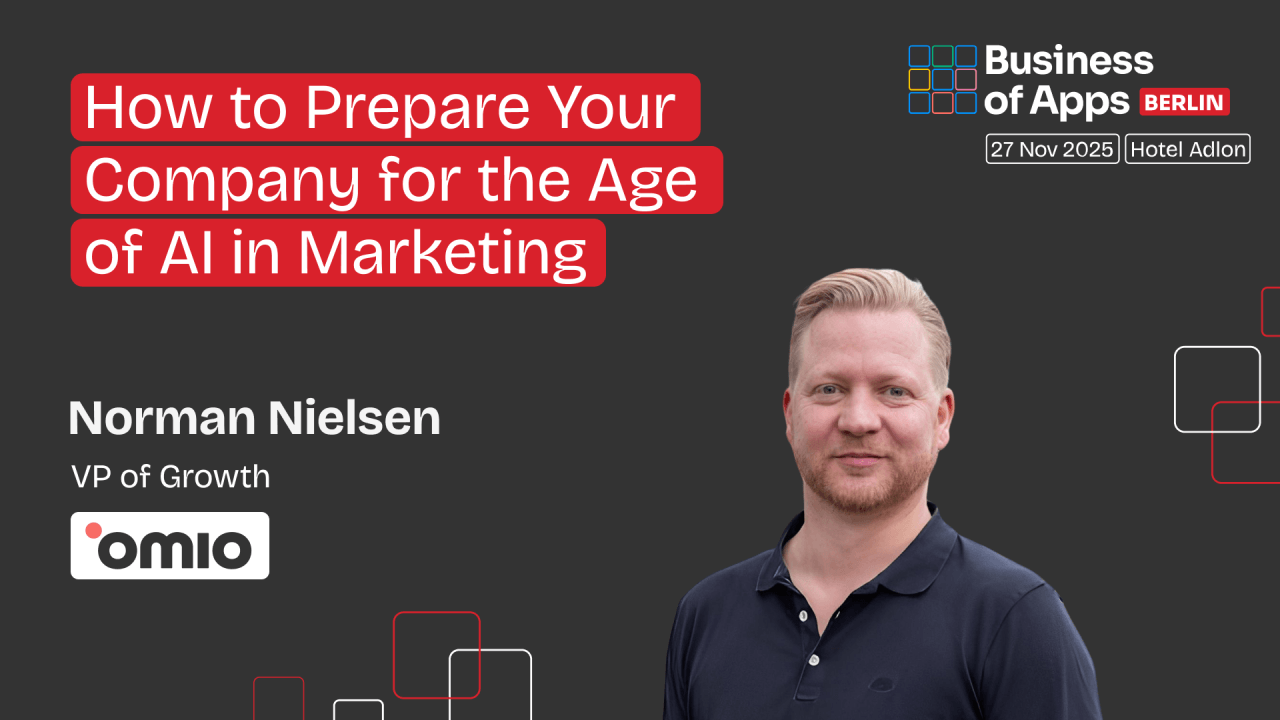Norman Nielsen, VP of Growth at Omio, will be speaking at Business of Apps Berlin (formerly App Promotion Summit Berlin). He met with us for a quick, informal chat to give us an overview what he and his team are cooking for the event.
Can you start by walking us through your career path? How did you get to where you are today?
I wasn’t a model student at the beginning, and then, when I could choose my own topics, I went quite crazy on innovation management and online marketing. I was one of the first studying online marketing, so I could go with my professor to China to study and see the world there. I worked in India after that, which was quite a cool experience, and then started right away with a small team at Axel Springer, doing a lot of SEO, partnerships, and affiliate work, and presenting on the market for quite a long time.
One day a very big fashion retailer, Zalando, came up and said, “Hey Norman, you want to keep working with four people or scale to eighty people?” I said, “Yeah, let’s do it.” Six days later I signed with them, and that was the beginning of my in-house professional career. We had lots of freedom to build everything, so we ramped up all the countries. It was a great time.
Then one Christmas I met the founder of Omio and he said, “You want to do forty countries?” And I said, “Of course.” Again, we started quickly ramping up all the markets. Omio is now in Asia, South America, North America, Europe of course, bringing travel tickets — train, bus, flights, ferries — to the customer. And that’s the mission here: focusing on highly scalable global content, global apps, and global approaches while keeping the local customer in mind.
And for that we use a lot of AI. It’s one of my favorite topics, in fact. I have a friend from MIT, and in 2019 she said, “Norman, you have to watch OpenAI. They do cool stuff.” And there was an API from another SaaS company, so we could use OpenAI already, way before ChatGPT came out. That was the really big first touchpoint for me and my team.
What advice do you have for anyone aspiring to grow into a role like yours?
I think if you don’t stay curious, especially nowadays, that’s a big failure. That’s what I learned in innovation management. You have to do the business as usual, no question. You have to be resilient, always delivering. But if you’re not curious, if you don’t want to go for innovations as well, you will probably not have the leading edge. So first advice, be both consistent when you deliver, but always be interested in exploring new paths.
Norman’s top career advice
Source: Business of Apps via YouTube
Surround yourself with builders, surround yourself with an environment that lets you grow. If you’re in an environment that is doing the nine-to-five thing or whatever it is in the Western world now, I’m not sure you will be able to grow that quickly or efficiently.
Also, you need to have a very deep skillset in one thing and then become a T-shaped professional. In other words, have a deep understanding of one domain — data, product, storytelling, etc. — and then you can go broad into other channels, other products.
You’ve been working in the app space for over fifteen years now. In your opinion, how has the space changed in the last few years?
I’ve been in the market for seventeen years now, and I remember when apps really came up, it was all about UA at the time. Now it’s more about how you do testing better, how you go from pure acquisition to lifetime value, how you shift customers from web to app more.
It’s fundamental how you actually use the new AI functions out there. Everybody talks about AI, but AI means predicting churn better, generating one-to-one communications. The content pieces you can create now are really personalised. Everybody has been saying this for the last ten years; but now is the time for real personalization, I think.
Drawing on your years of experience in the app industry, what lessons have stayed with you that still apply today?
What I see in companies is that web-to-app is underused. This has been going on for a long time now. Growth channels and product have to come much closer together. I know some people talk about it, but product and marketing are not always that aligned, because you need the learnings from the beginning and you shift them down to the product and back again. So a lot of feedback loops are needed here. Maybe it even has to be in one team.
The same applies to web-to-app. You have to look at seamless cross-platform communication and platform funnels. I think that’s underestimated, and that’s where you have to go nowadays.
You will be speaking at Business of Apps Berlin (formerly App Promotion Summit Berlin). Can you give us a run-through of what you’ll be talking about?
I will be talking about how to make the most of AI for app marketing, making an important distinction between an AI framework approach and an AI tools approach. It’s quite important, I think. I personally think the more people you have in the company, the more employees you have, the more you should think about exactly these decisions: what frameworks there are out there, and how to engage everyone, not only the top 10–15% or so.
Then we go deeper into what agent-assisted growth systems there are. How do you actually scale when you have more than one app, more than one domain, and so on?
AI frameworks over AI tools
Source: Business of Apps via YouTube
From the frameworks, we then go down to AI as a co-pilot for CRM. How do you actually use it to build AI-driven segments, AI timings, AI personalised content, and have better testing and predicting.
And at the end, it’s automation, yes, but also augmentation. I will try to show what’s possible when you come from a framework down to a single customer.
In your opinion, what’s the real role of AI in app marketing?
There are the obvious reasons: all the big tools have AI implemented — Meta, Google, and so on — so we don’t have to answer that one. But if we look at Tim Ferriss’s The Four-Hour Workweek, what did he do? He had assistants, doesn’t matter whether human or AI, to cut down his work week to four hours and do all kinds of stuff for him. This applies to the new agent world we are heading into. You can create much smarter companions that help you on Mondays with your numbers, your forecasts, and your number interpretations. Especially in marketing, this automation is quite important.
The second thing is AI allows us to hyper-personalise not only CRM but every storytelling now. You can go local, national, international, but also one-to-one again. Storytelling at scale, not only the one campaign per month.
What we see now already in LLMs is that communication is more like a dialogue. People get used to it quite fast. Same thing happened with same-day delivery at no extra payment — people get used to it and then they think that’s the way companies should operate. So you also have to get into the mode and offer a continuous conversation on-site, in the app, in customer service, even in marketing. You cannot just show the same ads twice in the future; you have to build the storyline. And AI will for sure help with scaling this.
At the end, you combine LLMs — whatever it is, ChatGPT, Perplexity, Claude, or whatever — with the behavioural data you have, first-party data, and real-time context. For us, for example, if the train has a delay, that’s the information a commuter needs. That’s what I want to see from CRM systems and marketing in the future — combining all these elements.
What do you think people often get wrong when talking about AI in app marketing?
As we said at the beginning, you have to decide if you use it as a framework and combine all the sources, and not only just do one dialogue with just one LLM at a time. Someone said a real expert of AI in the future will have a hundred conversations per day with AI, not only ten, and I think that’s exactly where we are headed.
You have to be ready to use AI. So next to the framework, you need the data to be ready and cleaned up. You need guardrails — not only in an ethical sense but also for what each team can use. Maybe you need your own LLM on your own systems to be fairly ethical, fairly GDPR-conformant, and so on.
And at the end, you need cross-functional integration. It doesn’t help if product is using something different than marketing and you cannot combine them. So we have to listen much more to AI and be smarter here, but still not give up on judging what comes out, reducing hallucinations, and so on. I think that’s the main point people should think about more.
App marketing is diverse — ASO, advertising, content, CRM, etc. What has AI’s effect been on these subfields, and where do you think things are heading?
ASO is already using a lot of AI testing with generative metas, pictures, content, and other visuals. We’ve had a lot of success with these kinds of testing environments. So advertising and general content creation are already using a lot of AI. This is not a future prediction; this is what we can see now — sometimes bad, sometimes really good.
In the future, however, these channels will change in terms of scalability, production, smartness, and so on. Personally, it will save time for you, for me, for all of us. AI saves time. Airbnb said they integrated a new AI bot, and it saves them 15 to 20% of time or something like this. At first I thought, is that a lot or not? Twenty percent gain is a big thing. Even if AI doesn’t help you with 80% of saving time, already 20% is great.
How AI is changing growth today
Source: Business of Apps via YouTube
Going on, you will have a lot of AI-native growth loops, where content, SEO, and so on reinforce each other in real time. When you go on the website, you have all the web-to-app functions, but also down in the funnel, AI can offer much smarter recommendations, change pricing — this kind of stuff will come, too.
What is humans’ role in all this, especially around authenticity in content and creatives?
Let’s draw the positive picture. AI will support us and help us. All these negative things about losing jobs also come in every business with every interruption, with every next step of innovation. The one who uses it will have a great experience here.
The future will be how we orchestrate AI and human work in companies together. You can scale with AI, but being authentic, being an expert, bringing emotions in — that comes from humans. Only the one who combines these two worlds will win here. Real reviews from your customers or wherever you get them — from creators, influencers, macro-influencers, experts — these voices will deliver trust, and the scale comes from AI.
There was a talk from, I think, Mazda, an automotive company. They said 80% of their new models are AI-created. And to make the market fit, to make it great-looking for humans, the last 20% — this is the human in the loop; the human–machine combination we want to see. So a lot of AI work in there, yes, but also a lot of human empathy, human creativity.
If you don’t want to miss Norman’s session, make sure to get your Business of Apps Berlin ticket today.
Norman’s answers have been slightly edited for clarity.


